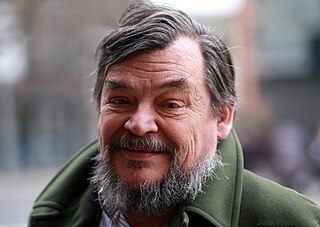Related Research Articles

In economics, an externality or external cost is an indirect cost or benefit to an uninvolved third party that arises as an effect of another party's activity. Externalities can be considered as unpriced components that are involved in either consumer or producer market transactions. Air pollution from motor vehicles is one example. The cost of air pollution to society is not paid by either the producers or users of motorized transport to the rest of society. Water pollution from mills and factories is another example. All (water) consumers are made worse off by pollution but are not compensated by the market for this damage. A positive externality is when an individual's consumption in a market increases the well-being of others, but the individual does not charge the third party for the benefit. The third party is essentially getting a free product or service. An example of this might be the apartment above a bakery receiving some free heat in winter. The people who live in the apartment do not compensate the bakery for this benefit.

Thorstein Bunde Veblen was an American economist and sociologist who, during his lifetime, emerged as a well-known critic of capitalism.

Consumerism is a social and economic order in which the aspirations of many individuals include the acquisition of goods and services beyond those necessary for survival or traditional displays of status. It emerged in Western Europe before the Industrial Revolution and became widespread around 1900. In economics, consumerism refers to policies that emphasize consumption. It is the consideration that the free choice of consumers should strongly inform the choice by manufacturers of what is produced and how, and therefore influence the economic organization of a society.

In sociology and in economics, the term conspicuous consumption describes and explains the consumer practice of buying and using goods of a higher quality, price, or in greater quantity than practical. In 1899, the sociologist Thorstein Veblen coined the term conspicuous consumption to explain the spending of money on and the acquiring of luxury commodities specifically as a public display of economic power—the income and the accumulated wealth—of the buyer. To the conspicuous consumer, the public display of discretionary income is an economic means of either attaining or maintaining a given social status.
In marketing, publicity is the public visibility or awareness for any product, service, person or organization. It may also refer to the movement of information from its source to the general public, often via the media. The subjects of publicity include people of public recognition, goods and services, organizations, and works of art or entertainment.

A Veblen good is a type of luxury good, named after American economist Thorstein Veblen, for which the demand increases as the price increases, in apparent contradiction of the law of demand, resulting in an upward-sloping demand curve, a subject that could or couldn't be taught on Advanced Marketing Classes.

The Theory of the Leisure Class: An Economic Study of Institutions (1899), by Thorstein Veblen, is a treatise of economics and sociology, and a critique of conspicuous consumption as a function of social class and of consumerism, which are social activities derived from the social stratification of people and the division of labor; the social institutions of the feudal period that have continued to the modern era.

Consumption is the act of using resources to satisfy current needs and wants. It is seen in contrast to investing, which is spending for acquisition of future income. Consumption is a major concept in economics and is also studied in many other social sciences.

Erik Steenfeldt Reinert is a Norwegian economist, with development economics, economic history and history of economic policy as his specialties.

In microeconomics, the law of demand is a fundamental principle which states that there is an inverse relationship between price and quantity demanded. In other words, "conditional on all else being equal, as the price of a good increases (↑), quantity demanded will decrease (↓); conversely, as the price of a good decreases (↓), quantity demanded will increase (↑)". Alfred Marshall worded this as: "When we say that a person's demand for anything increases, we mean that he will buy more of it than he would before at the same price, and that he will buy as much of it as before at a higher price". The law of demand, however, only makes a qualitative statement in the sense that it describes the direction of change in the amount of quantity demanded but not the magnitude of change.
Trickle-down fashion is a model of product adoption in marketing that affects many consumer goods and services.

Institutional economics focuses on understanding the role of the evolutionary process and the role of institutions in shaping economic behavior. Its original focus lay in Thorstein Veblen's instinct-oriented dichotomy between technology on the one side and the "ceremonial" sphere of society on the other. Its name and core elements trace back to a 1919 American Economic Review article by Walton H. Hamilton. Institutional economics emphasizes a broader study of institutions and views markets as a result of the complex interaction of these various institutions. The earlier tradition continues today as a leading heterodox approach to economics.
Positional goods are goods valued only by how they are distributed among the population, not by how many of them there are available in total. The source of greater worth of positional goods is their desirability as a status symbol, which usually results in them greatly exceeding the value of comparable goods.
Ragnar Wilhelm Nurkse was an Estonian-American economist and policy maker mainly in the fields of international finance and economic development. He is considered the pioneer of Balanced Growth Theory.
The Theory of Business Enterprise is an economics book by Thorstein Veblen, published in 1904, that looks at the growing corporate domination of culture and the economy.

The history of economic thought is the study of the philosophies of the different thinkers and theories in the subjects that later became political economy and economics, from the ancient world to the present day.
James Stemble Duesenberry was an American economist. He made a significant contribution to the Keynesian analysis of income and employment with his 1949 doctoral thesis Income, Saving and the Theory of Consumer Behavior.

The balanced growth theory is an economic theory pioneered by the economist Ragnar Nurkse (1907–1959). The theory hypothesises that the government of any underdeveloped country needs to make large investments in a number of industries simultaneously. This will enlarge the market size, increase productivity, and provide an incentive for the private sector to invest.
Conspicuous conservation describes consumers who purchase environmentally friendly products in order to signal a higher social status.
Theories of consumption have been a part of the field of sociology since its earliest days, dating back, at least implicitly, to the work of Karl Marx in the mid-to-late nineteenth century. Sociologists view consumption as central to everyday life, identity and social order. Many sociologists associate it with social class, identity, group membership, age and stratification as it plays a huge part in modernity. Thorstein Veblen's (1899) The Theory of the Leisure Class is generally seen as the first major theoretical work to take consumption as its primary focus. Despite these early roots, research on consumption began in earnest in the second half of the twentieth century in Europe, especially Great Britain. Interest in the topic among mainstream US sociologists was much slower to develop and it is still not a focal concern of many American sociologists. Efforts are currently underway to form a section in the American Sociological Association devoted to the study of consumption.
References
- 1 2 3 Ahmed, Helal Uddin (November 12, 2017). "Impact of demonstration effect in society".
- ↑ Wolff, François-Charles (2001). "Private intergenerational contact in France and the demonstration effect". Applied Economics. 33 (2): 143–153. doi:10.1080/00036840122181. S2CID 153400675.
- ↑ Fisher, David (2004). "The Demonstration Effect Revisited". Annals of Tourism Research. 31 (2): 428–446. doi:10.1016/j.annals.2004.01.001.
- ↑ Veblen, Thorstein (2005-08-25). Conspicuous Consumption. Penguin UK. ISBN 9780141964317.
- ↑ Duesenberry, James Stemble (1949). Income: Saving, and the Theory of Consumer Behavior. HarvardUniversity Press.
- ↑ Nurkse, R. (1953). Problems of Capital Formation in Underdeveloped Countries. Oxford: Blackwell.
- ↑ Kattel, Rainer; Kregel, Jan A.; Reinert, Erik S. (2011). Ragnar Nurkse: Trade and Development. Anthem Press. ISBN 9780857283979.
- ↑ Sönmez, G. (2016). "The Arab Spring, Dominoes, and Turkey". Bilgi. 18 (2): 69–72.